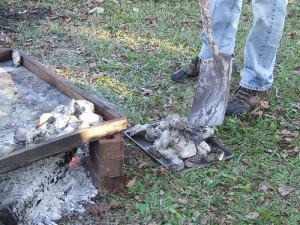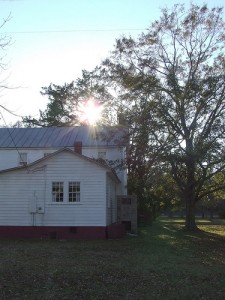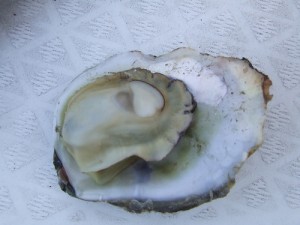by David Cecelski
My favorite oyster roast of the year is the one that we do at our farm the day after Thanksgiving. All fall I save wood for that fire. My brother brings oysters from Stump Sound and washes them that morning at the carwash in town. Then we build a bonfire in the backyard, between the chicken coop and the field on Miss Beadie’s side. When the fire burns down to coals, we rake them under a piece of tin propped up on bricks. My brother puts the oysters on the tin and lays a wet burlap bag over them. The smell that rises up off the oysters with the steam is that of salt marsh and the sea.
When the oysters are done, my brother shovels them off the fire and we spread them on a table that we have set out in the yard. We pass out oyster knives and rags to hold onto the hot shells. We sit out there by the field and savor the smoky flavor of the oysters.
When we start getting ready for the oyster roast, we have mostly our immediate family there, maybe 15 or 16 of us. We’re never sure who else might show up, though my cousin Edsel, now eighty six, usually comes early and helps with the fire. After the fire is going, he and my mother sit and talk and watch the children and the dogs running all over the pasture.
We always have at least a few neighbors drop by, as well as one of Miss Beadie’s grandsons. He lives in Richmond, but usually gets home for the holiday. Plenty of cousins are always there, too. This year my mother’s first cousin, Glenn, was one of them. He and my mother used to work tobacco together when they were children in the 1930s and they are still close friends. He lives away now and we only see him every few years, but he’s just the sort of long-lost cousin who’s likely to appear at the oyster roast.
More and more of Henderson Godette’s grandchildren and great-grandchildren are at the oyster roast every year, too. When my mother was a girl, Henderson lived in Craven Corner, a couple miles down the road from us. He was a gifted master carpenter, as well as a farmer, a storekeeper, and a bootlegger. He died when I was 7 or 8 years old, but I still remember him, a lanky, light-skinned black man wearing overalls and brogans. He was my grandfather’s half-brother and, despite their living in the Jim Crow South, they could not have been closer.
My grandfather died in a terrible accident in 1937. Many, many years later, Harold Godette, one of Henderson’s sons, told me that he remembered when his father heard the news. Henderson was plowing in the field at the time. According to Mr. Harold, his daddy fell to his knees behind the plow and was just sobbing and sobbing and sobbing.
After my grandfather was buried, Henderson and his nine sons often came by and, unasked, did things to look after my grandmother and the farm. Some were little chores, like repairing a lawn mower engine or fixing a fence post. Others were big things, like the time that, again without being asked, they built my grandmother a new kitchen.
Even when I was a child, Henderson’s sons were still fixing roofs, painting the barn and doing other chores for my grandmother. When you thanked them, they’d just say, “Anything for Mr. David.” They meant my grandfather, not me, of course, but by that time my grandfather had been dead for thirty years. I like to think that Henderson and David would be glad to see their grandchildren and great-grandchildren standing around the fire and sharing oysters.
As night comes on and it starts to grow colder, we all move closer to the fire to stay warm. Everybody talks about how their mommas are doing and exclaims how big the children have grown and says how good it feels to be together again. My mother sits next to the fire and relishes her oysters. She can wield an oyster knife as well as anybody, but she doesn’t complain if one of the more solicitous grandkids opens a few for her.
By nine-thirty or ten o’clock, most of the crowd has left and gone home or, if it’s cold, sought comfort in the warmth of the kitchen. Some of the ones who aren’t quite as devoted to oysters might be eating Thanksgiving leftovers in there. The rest of us huddle closer around the fire while we finish up the oysters. The talk gets quieter, and more introspective, and we all watch the moon come up over Miss Beadie’s barn. My mother is always one of the last to leave the fire. When she does go inside, I sit out there by myself and watch the stars until the last embers go out.



Leave a Reply